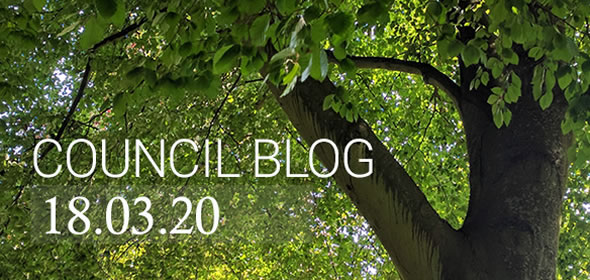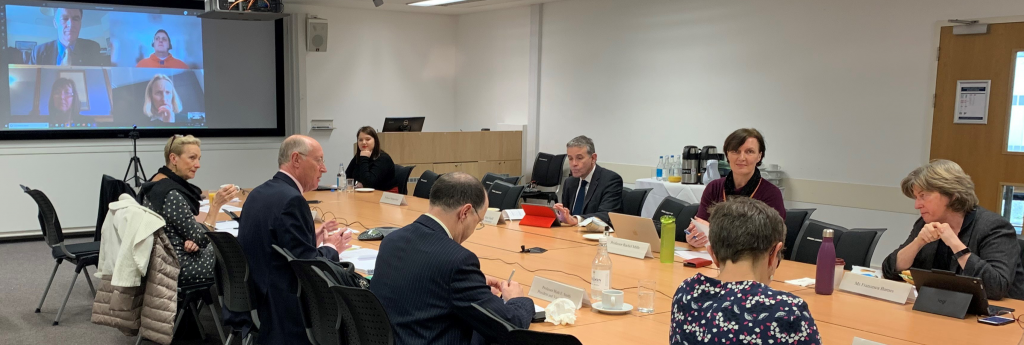Author: Philip Greenish, Chair of Council
Please note: information in this blog was accurate at the time of the meeting – 18 March 2020 – and may now have been superseded.
Council met on 18 March and it will be no surprise that the agenda was dominated by the impact of the global COVID-19 (coronavirus) pandemic, and the actions the University is taking in response to the virus. In line with guidance, most Council members attended via video-conference or telephone, with only a minority present in the room, and seated well apart from each other.

The Vice-Chancellor gave a brief overview, thanking all staff and students for their response and cooperation to date. Richard Middleton, Chief Operating Officer (Interim), started by briefing Council on actions already taken and those planned for the immediate future. He was followed by Emily Harrison, President of the Students’ Union (SUSU), who briefed members on its actions and raised some issues that required clarity. Emily thanked the University for the quality of communications to date, recognising that all students questions could not yet be answered. Alex Neill, Vice-President (Education), reported on actions taken and plans to ensure that we are able to deliver quality education fully online by the start of next term, and that all students who expected to graduate in 2020 will be able to do so, even if it is later than originally planned (summer graduation ceremonies having already been postponed). This will be regardless of where students are living. Finally, Sarah Pook, Executive Director of Finance, briefed on the financial implications of the virus in the short to medium term, and on the modelling of the impact in the longer term.

Council members practising social distancing at their latest meeting, with some members attending via teleconference and webcam
Much of the detail we discussed has been communicated in other briefings to the University community, so I’ll try to avoid repetition here. Council members raised many issues and questions during the briefing, all of which were answered in full. It was clear to us all that the quality of planning, decision-making and communicating has been of the highest order, in the most difficult and uncertain of circumstances. Examples include decisions made to end term a week early, and to keep accommodation open so that our students can make their own decision on where they should live, knowing that individual circumstances will be markedly different. We were particularly pleased that the wellbeing of all students and staff is at the centre of planning, and with the efforts being made to communicate comprehensively.
In summary, while the University community faces many extraordinary challenges, Council was most impressed by the way in which so many across the whole University have responded, and by the leadership and commitment that is so evident. The situation may become harder still, but we know that we will continue to adapt our approach, to protect our students and staff.
We then continued with what might be considered a ’normal’ agenda. We approved the University Economy Model, which will now be used as the baseline for the inevitable changes brought about by COVID-19. In similar vein, we noted the January management accounts which no longer represent the University’s in-year financial position. We approved the changes to Senate’s Terms of Reference. We briefly considered progress with implementing recommendations of the Council effectiveness review and on staff engagement, and we noted the annual Research Integrity Statement. We also recognised that progress in delivering the key strategic decisions taken at our January Awayday was going to slow for the immediate future. This includes the revisions of our Key Performance Indicators (KPIs).
In this busy agenda, we made time to consider the very important cross-cutting theme of sustainability. Rachel Mills, Dean of the Faculty of Environmental and Life Sciences (FELS) and lead on sustainability, opened the discussion with a brief on the University’s current strengths and weaknesses in relation to carbon neutrality, as well as our likely targets. Council strongly supported current initiatives and acknowledged our research strengths – we are 12th globally in the Times Higher Education (THE) impact rankings against UN Sustainable Development Goal metrics. We know sustainability is truly important to a large number of students and staff, and that we need to get better at telling our story, with a view to increasing our University’s ambitions. We asked for an update in a year’s time.
We concluded a long meeting confident that the University is being well led during this period of exceptional difficulty. Council wants to express its thanks to the whole University community for the way in which the challenge presented by COVID-19 is being met.